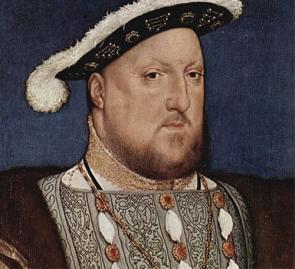Someone recently commented that they had not heard of many of the people on this blog. Obviously, this is great and I hope that they have learnt something which they knew nothing about before. However, it got me thinking about how well we know historical characters. Sometimes, the most interesting history makes you see a new side of something which you thought you knew quite well.
 There are many examples of this but Henry VIII makes a good one. He is one of the most famous characters in History and you'd be hard pushed to find someone who didn't know anything about him.
There are many examples of this but Henry VIII makes a good one. He is one of the most famous characters in History and you'd be hard pushed to find someone who didn't know anything about him. When I asked my year 8s what they thought of him they came up with words like fat, mean and greedy; summed up well in this video: http://www.youtube.com/watch?v=-fadCAHjN-s
Whilst Henry was probably all of these things at some point in his life, once you dig beneath the surface, it's possible to get a more complex idea about his character.
 Many people know that Henry had a hand in setting up the Church of England and reducing the power of the pope in England, partly over his affair with the young and beautiful Anne Boleyn. Whilst this is true, it would be a mistake to think that he didn't care about the church. When Martin Luther released his 95 theses (triggering the reformation), Henry produced a theological rebuff (right) which included so much pious zeal that the pope bestowed the title of Fidei defensor (defender of the faith) on every English monarch. You can still see the F.D. on any British coin today (take a look now if you have any spare change lying around).
Many people know that Henry had a hand in setting up the Church of England and reducing the power of the pope in England, partly over his affair with the young and beautiful Anne Boleyn. Whilst this is true, it would be a mistake to think that he didn't care about the church. When Martin Luther released his 95 theses (triggering the reformation), Henry produced a theological rebuff (right) which included so much pious zeal that the pope bestowed the title of Fidei defensor (defender of the faith) on every English monarch. You can still see the F.D. on any British coin today (take a look now if you have any spare change lying around).Before Henry's older brother Arthur died, he even intended to follow a life in the church. This doesn't take away from the damage which Henry caused to the monastic and church life of England but does give an intriguing dilemma. How should we see him?
Henry's relationship with women is another famous part of his character. Some see him as a disgusting old man throwing himself at any available woman at the Tudor court. It's also difficult to get away from the fact that two of his wives were beheaded on his orders (none of the arguments in my house ever get nearly that bad!). If you read Phillipa Gregory books you might also know something about his romantic side which seems a world apart from this alternate view. The below is a letter to Anne Boleyn and even though you know the ending, it's hard not to get taken in by the words.
 "Mine
own sweetheart, these shall be to advertise you of the great loneliness that I
find here since your departing…I
think your kindness
and my fervents of love causeth it…Wishing myself (specially an
evening) in my sweetheart's arms, …I trust shortly to kiss. Written with the hand of
him that was, is, and shall be yours by his will."
"Mine
own sweetheart, these shall be to advertise you of the great loneliness that I
find here since your departing…I
think your kindness
and my fervents of love causeth it…Wishing myself (specially an
evening) in my sweetheart's arms, …I trust shortly to kiss. Written with the hand of
him that was, is, and shall be yours by his will."H.R.
The final aspect of Henry's reputation which is glaringly obvious was the immense size of his belly. Armour from his final years shows the amazing girth needed to fit him in. It's easy to forget that in his younger years Henry was a keen jouster and competed despite the best advice of those around him. On one occasion Henry was very nearly killed in a joust. He also played tennis and regularly went out hunting wild boar.
http://www.bbc.co.uk/learningzone/clips/armour-worn-by-henry-viii/7222.html
So, Henry VIII: a pious, romantic, athlete. If anything, the ideas shown here express the difficulty of summing up an entire life with only a few words. Titles such as Edward the Confessor, Alfred the Great or William the Conqueror can often obscure the truth of a person. I find history far more interesting when it exposes the best of a person alongside the worst, the great moments in an otherwise awful life or the failings of a great person. Ultimately, when history deals with people it must be complicated, contradictory and difficult because that's everything that most people are.
